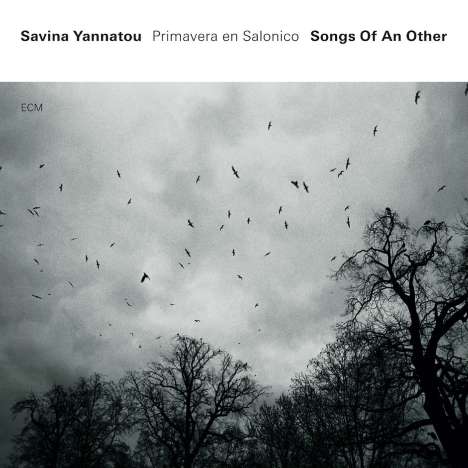Savina Yannatou: Songs Of An Other auf CD
Songs Of An Other
Herkömmliche CD, die mit allen CD-Playern und Computerlaufwerken, aber auch mit den meisten SACD- oder Multiplayern abspielbar ist.
(soweit verfügbar beim Lieferanten)
- Label:
- ECM
- Aufnahmejahr ca.:
- 2007
- Artikelnummer:
- 8161198
- UPC/EAN:
- 0602517727205
- Erscheinungstermin:
- 29.8.2008
“Songs Of An Other”, recorded in Athens last October, is the third ECM album by Greek singer Savina Yannatou & Primavera en Salonico. It finds the adventurous collective sailing through gtraditional songs from Armenia, Macedonia, Serbia, Kazakhstan, and Southern Italy as well as Greece, adding a 16th century hymn from the Yiddish tradition.
Once again, the arrangements, by Kostas Vomvolos with input from all band members, find the points that suggest a unity of the traditions, while Savina locates areas where experimental vocal technique can overlap with the idiosyncrasies of folk singing, as folk melody erupts into free areas. The improvisational quotient is stronger on “Songs Of An Other” than on “Sumiglia”, the collective’s 2004 album and the whole ensemble’s growth of confidence is immediately evident. They’ve toured extensively in the last four years and the group sound is at once tighter and liberated. Distinctions between ‘jazz’ players and traditional instrumentalists inside the ensemble no longer apply. Each musician is fully engaged in shaping and developing the music. “If you start improvising then something else happens, just as one thought will take you to another, without the connections being obvious.” Yannatou has said. “This time the selection of material seemed to emphasize strongly rhythmic elements and ‘strange’ melodies, and I think this encouraged the flow of improvisational ideas.” (“Za lioubih maimo tri momi” from Pirin Macedonia is immediately impressive in this aspect).
On “Sumiglia”, songs were effectively portraits; here the themes are many - love songs, religious songs, philosophical meditations, lullabies, songs of working the land, songs of leaving and returning -all bringing forth evocative playing. “Ah, Marouli” is from the Greek island of Calymnos, and is a traditional song of sponge-divers. “Addio amore” is an olive-harvester’s song, “Omar hashem leyakoyv” a Yiddish song from the Ashkenazic tradition, probably from the 16th century. In addition to the arrangements of traditional material, there are two new compositions based on Greek sources - “O Yannis kai o drakos”, and “Perperouna” respectively a dragon-slaying song and a gentle call for rain. The first features percussionist Kostas Theodorou on second double-bass, the latter cross-references Burundi rhythm with Greek melody, and adds African kalimba to the arrangement.
“There were no limits imposed about where the music might come from,” Savina says. Much of the choice of material – intuitive rather than systematic or conceptual- was made by sifting through hundreds of folk tunes, from all over the world, archived by nay player Harris Lambrakis, who is also a musicologist. “I was simply being open to anything that held my attention.” Her choices spurred Kostas Vomvolos to find ways to arrange the material that would fully engage the playing capacity of all members of Primavera en Salonico. “Sumiglia”, she reflects, was in some ways a record of restraint, of holding back, of putting the focus on the songs’ narratives. “Songs of An Other”, by contrast, has more to do with letting go, opening up, flying... “On the last recording we were asking ourselves: What are these songs about? This time around we were simply saying: Let’s play!”
Born in Athens, Yannatou studied at the National Conservatory. While still a student she sang for Greek National Radio 3, under the direction of composer Manos Hadjidakis. In the ensuing years she explored a range of options from renaissance and baroque music to contemporary composition as well as Greek “entechno” art songs. In the early 90s she experimented with free improvisation, with both Greek and international collaborators and began to work also with a circle of Thessaloniki-based musicians who formed the band Primavera en Salonico for her recording of Sephardic folk songs from the region. The group is now in its 15th year, its progress informed by its members’ range of activities:
Kostas Vomvolos, the band’s principal arranger, is a resourceful accordionist, and an innovative exponent of the qanun (or psaltery). Well known in Greece as a writer of theatre music he has scored more than fifty plays and is, furthermore, an authority on the reconstruction of ancient music.
Oud and guitar player Yannis Alexandris worked for the State Theatre of Northern Greece in the 1960s, originally as a member of the choir, and also played Greek music as a guitarist in the taverns. From 1973 he lived in Sweden for ten years, a period in which he intensified his studies of Greek traditional music. A member of the Tombourlika ensemble, whose vast repertoire of Rembetika songs is legendary, Yannis is also highly regarded as an instrument builder, and has for thirty years made bouzoukis, baglamas, lutes, lyras and more.
Violinist Kyriakos Gouventas recently co-founded the folk orchestra Estudiantina. He has worked with many of the most skilled traditional singers and musicians in Greece and played also with orchestras and chamber ensembles.
Bassist Michalis Siganidis is also a poet and songwriter. In the late 1970s he belonged, along with Floros Floridis and Sakis Papadimitriou to the first wave of Greek players addressing free improvisation. He has also written music for stage and screen.
Kostas Theodorou who plays percussion in Primavera en Salonico is a self-taught musician whose history also includes periods as a guitarist and bassist. He has worked with Bulgarian kaval player Theodossij Spassov, combines Greek rhythms with those of the neighbouring lands and once described himself as ‘an avant-garde folk musician’.
Harris Lambrakis, much in demand as a nay player on the traditional circuit, also plays with jazz and contemporary music groups. He is currently researching urban traditional music in Greece at the musicology department of the University of Athens.
Pressestimmen:
The singer’s voice is as fresh and versatile as ever, taking in hymnal lyricism, stirring folk balladry and a freer, essentially instrumental approach comprising cries, shries, ululation, grunts and cackles. Most of the material is rooted in traditional tunes, but the arrangements … leave great leeway rhythmically and melodically. … Amazingly, the band’s expertise and the crystal-clear production ensure they all go gloriously together. Geoff Andrew, Jazzwise
These 12 traditional pieces, arranged by accordion and qanun player and group member Kostas Vomvolos, are traditional works from Armenia, Bulgaria, Greece, Italy, Kazakhstan and Serbia. They are sometimes melancholy, sometimes bucolic, sometimes upside-your-head spinning dervish-like funk pieces, given a new interpretation by the Can-style improvising philosophy of the group. It could be Oregon, it could be early Weather Report, but the most important thing about Yannatou and Primavera en Salonico is that this is the sound of cultures talking to each other, which nowadays we need more than ever. John Gill, The Wire
Die griechische Sängerin Savina Yannatou ist keine Folk-Interpretin im engeren Sinne. Sie beherrscht die Kunst der Interpretation, belebt voller Ausdruckskraft die Figuren, schlüpft in Rollen und wechselt diese so mühelos wie die Sprachen und Gesangstechniken, die sie sich zu eigen macht. Vor allem : sie experimentiert. … Ihr Ensemble Primavera en Salonico rekrutiert sich aus jazzversierten Instrumentalisten und improvisationserfahrenen Folk-Musikern, und so kommen bei Yannatou Interpretation und Improvisation, Überlieferung und Experiment so gleichberechtigt zur Geltung wie nur selten. Wenn auch nicht in ein und demselben Song. Vielmehr gliedert sich das Programm in zwei Gruppen : Hier … behutsam arrangierte Lieder, die vergleichsweise « traditionell » interpretiert werden ; da Kollektivimprovisationen auf Grundlage griechischer Volkslieder. Erstere sind betörend, Letztere sind die Sensation. Berthold Klostermann, Fono Forum
Disk 1 von 1 (CD)
-
1 Sareri Hovin Mernem
-
2 Za Lioubih Maimo Tri Momi
-
3 Smilj Smiljana
-
4 Dunie Au
-
5 O Yannis Kai O Drakos
-
6 Albanian Lullabye
-
7 Omar Hashem Leyakoyv
-
8 Radile
-
9 Sassuni Oror
-
10 Addio Amore
-
11 Perperouna
-
12 Ah, Marouli



